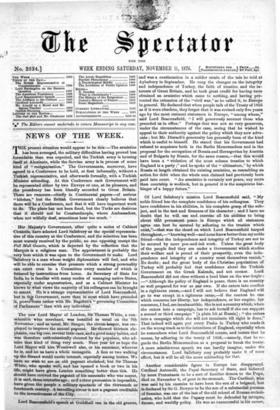Lord Beaconsfield's speech at Guildhall ran in the old groove,
and was a continuation in a milder strain of the tale he told at Aylesbury in September. He rang the changes on the integrity and independence of Turkey, the faith of treaties, and the in- terests of Great Britain, and he took great credit for having once obtained an armistice which came to nothing, and having pre- vented the extension of the "civil war," as he called it, to Europe in general. He declared that when people talk of the Treaty of 1856 as if it were obsolete, they forget that it was revised only five years ago by the most eminent statesmen in Europe, " among whom," said Lord Beaconsfield, " E will generously account those who preceded us in office." Perhaps that was not so very generous, under the circumstances of the case, seeing that he wished to appeal to their authority against the policy which they now advo- cate ; but Mr. Disraeli's generosity has generally been of the kind which is useful to himself. He stated that his Government had refused to acquiesce both in the Berlin Memorandum and in the proposal for the occupation of Bosnia and Herzegovina by Austria and of Bulgaria by Russia, for the same reason,—that this would have been a " violation of the most solemn treaties to which England is a party ;" and he spoke of the " ultimatum," by which Russia at length obtained the existing armistice, as resembling an action for debt when the whole sum claimed had previously been paid into court. " An armistice is certainly not peace, any more than courtship is wedlock, but in general it is the auspicious har- binger of a happy future."
































